What Drives Winning Workbook 2
$25.00
Conversations & Exercises
From The 2016 Event
This workbook is full of real-life examples and time-tested advice from some of the winningest coaches in sports history.
- Features 17 talks from National Championship coaches at the 2016 conference
- Over 90 exercises to use with your teams and coaching staff
- High quality, spiral-bound book with more than 130 pages of content

“What Drives Winning is long overdue. Brett masterfully articulates how character building is the ultimate prize in the pursuit of athletic achievement. This book is immensely practical and filled with time tested wisdom.”
– Dr. Jim Loehr, Performance Psychologist

“There is a changing landscape in our coaching profession right now. What I see in this cutting-edge book is our future. Just like all of our sports evolve, our profession has as well and what Brett has to offer in What Drives Winning is our PhD. This is a very important book.”
– Anson Dorrance, North Carolina Women’s Soccer
Order What Drives Winning Workbook 2
The 2016 Event Edition
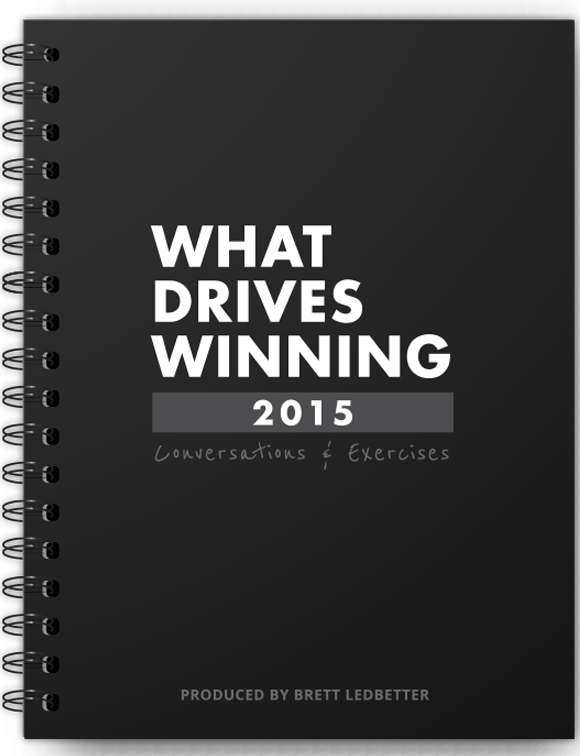
$25.00 Add to cart
Order for your team and
save with bulk pricing:
5-10: $20 each
11-20: $17.50 each
21+: $15 each
In stock
REVIEWS
Tell us what you think or ask a question.
LEARN
Watch the Videos:

Watch the Conference this book inspired.
Learn More
Join the Coaching Lab:

Online sessions with our co-founders
Learn More
If you want to lead at the highest level, you will eventually manage people more powerful than you. Those people (like most high performers) don’t want to be told what to do.
When it comes to influencing future behavior, ask yourself, which is more important: what you tell someone or what they tell themselves?
I asked a successful coach, “What’s the best way to change undesired behavior?” He laughed, “The best? Or the fastest?” When there are clear power dynamics, you can use a set of tactics that work on a short-term basis to produce results. But if you choose that approach, that’s a miserable way to spend your time on Earth. It’s a hollow path toward empty W’s.
Everyone has a private voice that the world doesn’t get to hear. And if you’re like most, you know that voice is incredibly important. A question-based approach toward leadership development helps train that private voice into an inner coach that can help someone navigate the storms of life.
This book is designed to do one thing: help you ask better questions. We’ve developed a playbook with 52 Question-Based Tools (QBTs) to challenge you to challenge the people you lead to find their best.
– Brett Ledbetter
A coach shared with me what he felt drove his success. He said, “I feel like I’ve learned how to control my team in order to suppress other teams.” That’s a dark space to live in. Especially when that approach has been positively reinforced by so many wins and a celebrated Hall-of-Fame career. It can leave you asking a lot of questions about life.
Many coaches that I’ve observed have leveraged highly controlled environments to produce the consistent behavior necessary to win at a high level. But nobody really feels good about it. That’s why it took me so long to write this book. I didn’t want to study how people used their power to force control. I wanted to write a different book. Once I understood how to do that, I decided to take this journey.
I asked a successful coach, “What’s the best way to change undesired behavior?” He laughed, “The best? Or the fastest?” When there are clear power dynamics, you can use a set of tactics that work on a short-term basis to produce results. But if you choose that approach, that’s a miserable way to spend your time on Earth. It’s a hollow path toward empty W’s.
That’s why I love the NBA. That environment requires a higher form of management. If you strip the coach of his power, he has to rely on logic, listening, and learning how to meet people where they are. That job becomes about winning influence. The respect is earned, not given, in that league.
I think about the coaches who clearly have power over their team, but choose to win influence instead. That rare group is motivated to find their next level as leaders. Their example influences people to discover their best.
That’s why I love the NBA. That environment requires a higher form of management. If you strip the coach of his power, he has to rely on logic, listening, and learning how to meet people where they are. That job becomes about winning influence. The respect is earned, not given, in that league.
– Brett Ledbetter
I asked players who attended our basketball academy, “What are the first two questions you get asked after a game, by someone who wasn’t at the game?” They all responded with the same two questions:
“Did you win?”
“How many points did you score?”
I started to ask athletes in different sports the same question. Everybody had a similar version. What does that show? It shows us what society values. Kids are being conditioned at an early age that results are what matter most.
I ask many athletes that I come across, “Is your sport moving you closer or further away from the person that you want to be?” Most of them answer, “Further away.”
What if there was a different way to approach your sport that would take the anxiety away and allow you to play freely? What if there was a way that you could actually leverage the forces of sport to become the person that you want to be? What Drives Winning is a book of conversations.
You’ll learn from championship coaches, the best professional athletes in the world, and leading researchers who’ll help you understand how to build your character and get better results.
– Brett Ledbetter
Want to Learn More?
The concepts in this book inspired the conversations at both the 2015 and 2016 What Drives Winning Conferences. You can watch the videos by selecting a year below.
I was challenged to sum up all the conversations that I had preparing this project. Here’s where I landed:
You have to fight just as hard to seek perspective as you do to win a championship. Society either shapes or distorts what you value. It starts when you’re young.
When you score, what happens? People applaud. When you win, people praise. When you lose, people express disappointment.
What’s happening? A value system is taking form. You’re learning what society values.
If you come from a house where your parent(s) are emotionally attached to your performance, they’re mirroring what society values—you’re taking cues from them on what’s important. In that case, it aligns with society, and you chase that…because that’s all you know.
If you come from a house where your parents are trying to shape you against what society values, you feel in constant conflict—because every time you walk out of the front door, you see something different. In that case, you want to believe them, but you’re confused, because everywhere you look, you’re confronted with what society values.
If man’s approval is important to you, you become a product of what he values. You sacrifice what’s really important to be successful. When you do that, you’re labeled as committed, driven,
or someone who possesses the right mindset.
You start to derive your confidence from that reinforcement. You learn what it takes to be great. Then, you take that information into your profession. You work and you work because that’s what the system rewards. That’s how you get recognized and set yourself apart.
The profession turns you into a 24-hour coach. Eventually, you get your shot. And you remember what got you there—WORK.
You direct your drive at what the system rewards: Winning. You become consumed. The important people in your life become number two—a long way back from number one.
And what happens? You win. Applause. People praise. And you feel the love. You have to keep up the good work.
You work harder and harder to outdo your last performance. Each time you do, that praise turns into expectation. Eventually you set the bar so high, you don’t know if you can reach it. And then you don’t.
People express disappointment. You become confused. It’s like they’ve forgotten how much you’ve done. You start to work harder and harder to appease them. It starts to seem like whatever you do, it’s never enough. Eventually you realize, this is how you’re spending your life on Earth.
A major internal conflict starts to develop. You start to ask yourself, “Is it worth it?” You realize that you’re asking that question more and more.
Eventually, you get to a place where you look yourself in the mirror, and you answer, “No.” And that’s when it shifts. You start to search. How did I get so far off track? What did I value? Why didn’t I make time for what was really important? What did the people I surrounded myself with reinforce?
That breakdown leads to a breakthrough. You realize that your choices put you in that situation.
And you feel blessed to have that awareness. Because you realize…you can do it differently, if you so choose.
– Brett Ledbetter
Want to Learn More?
This book reveals insights from coaches at the top of their sport and tools to help you determine your priorities. You can also watch the video series that this book inspired.
The What Drives Winning TEDx talk was my first attempt at sharing an idea on how to systematize character development. In the talk, I tried to capture the best lesson I learned in the first ten years of my career, when I was working with 5-12th graders at Ledbetter Basketball Academy. The Academy was a developmental environment designed to raise the level of the individual.
I started to ask the question: Can you take character development into the paid-to-win world of athletics? Five years ago, I transitioned from the Academy into becoming a performance consultant and wrote the book What Drives Winning. I would ask athletes, “Is your sport moving you closer or further away from the person you want to be?”
I realized through many conversations that sport had the power to take people away from who they wanted to be. I also realized that when you focused on developing the person first, it actually led to better results.
Coaches started to ask, “How do I do this with my team?” This book was written to help answer that question. The goal: to stimulate thought around how you could introduce some of these concepts in a team setting.
– Brett Ledbetter
Want to Learn More?
This book walks through practical examples with high-level teams around how to build character development into your program and create team cohesion. After reading the book, you’ll have the tools to get started. You can also watch the docuseries that this book inspired.
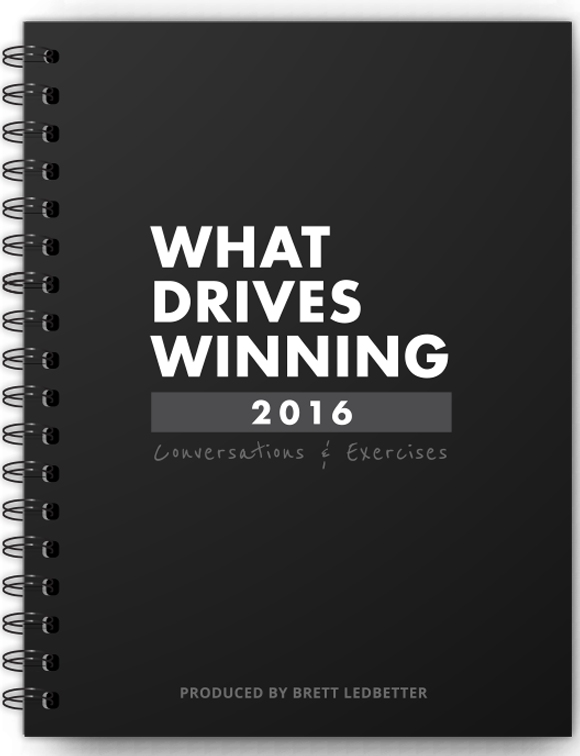
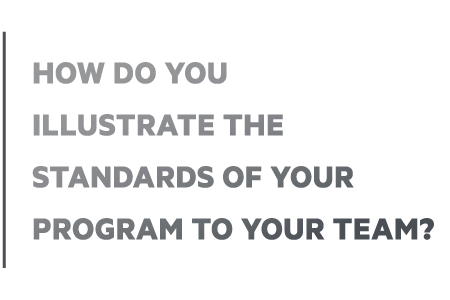
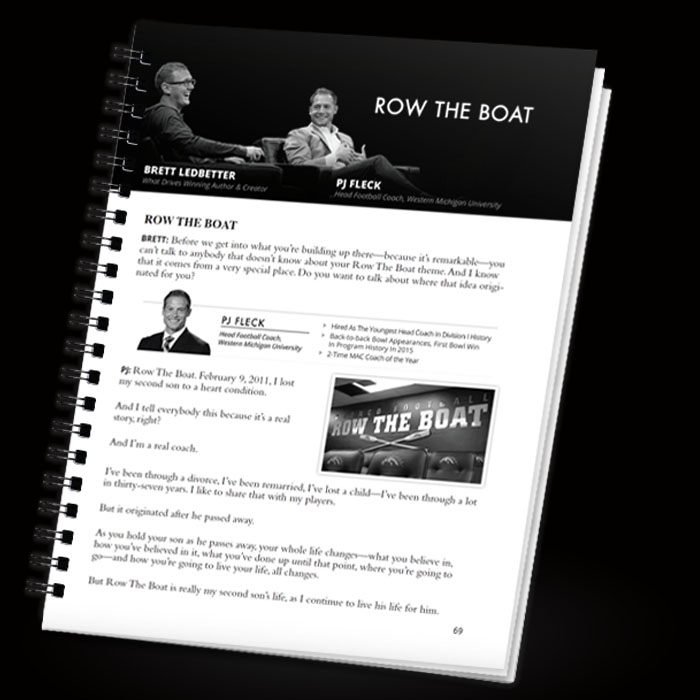
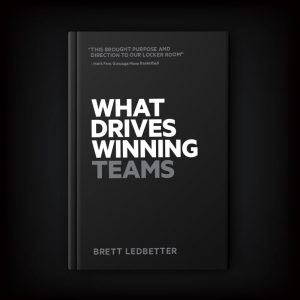


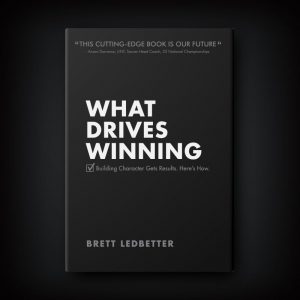
Jenny L. (verified owner) –
I bought it and used it a few years back. Always looking for team activities and thought provoking exercises that build teams
(0) (0) Watch Unwatch
Kelly F. –
Loved using activities with team
(0) (0) Watch Unwatch
Scott Z. –
I have read both and it’s just good to be able to think about what you and your team are doing and write things down, both as coaches and players. I use or modify some of the activities to fit into what is best for our team at that moment. They give me another way to listen and see things and another way to learn more about our athletes and me as a coach/person.
(0) (0) Watch Unwatch
Roy S. –
I have and have used both. They have proven easy to adapt and overwhelmingly beneficial to our program.
(0) (0) Watch Unwatch
Eric S. –
I’ve read and used both editions. I have used some of the pages with my athletes in classroom sessions.
(0) (0) Watch Unwatch
Suzy W. –
When there is a specific topic or character skill I want to explore with my players, I refer back to the activities in the books to keep things fresh. Plus they remind me of things that we did…and should do again.
(0) (0) Watch Unwatch
Lauren E. –
I have both the 2015 and the 2016 workbooks. I have used these in some of the smaller group meetings that I have had. Or with some of the younger players on my team that I think can benefit from some of the exercises.
(0) (0) Watch Unwatch
Scott D. (verified owner) –
I’ve read all the books. Great way to solidify in my mind, the material from the monthly sessions. In turn available for practice and teaching
(0) (0) Watch Unwatch
Karen J. –
The workbooks are fantastic for keep a running journal as I read through the chapters. The activities that are provided in the book increase your understanding of the content in the books.
(0) (0) Watch Unwatch
Craig D. (verified owner) –
2015 and 2016. Both had incredible information in how teams can best perform through their work with each other. I used both workbooks with our Sport Leadership Council developing ideas for our student athletes to use in situations that they were working through.
(0) (0) Watch Unwatch
Matthew N. –
We have really worked on the character skills over the past year and now will work on the moral skills as well
(0) (0) Watch Unwatch
Tim S. –
Specifically, I’ve taken the ideas in the workbook and worked with a couple of kids about their confidence issues. We talked about staying in the moment, control what you can, and focus on your character skills not the outcome of a game.
(0) (0) Watch Unwatch
Scott H. –
Both workbooks and these have been a GREAT resource with specific examples my coaches could use with their respective teams.
(0) (0) Watch Unwatch
Brett S. –
I have used both 2015 and 2016. I believe both were great for ideas on themes as well as driving culture. Many parts of both books I have used with individuals and with teams. The Brick by Brick theme was a foundation for our team this year and many of the things that the University of Florida Softball Team did we incorporated with our team.
(0) (0) Watch Unwatch
Jen C. –
Helps enhance the book
(0) (0) Watch Unwatch
Jason K. (verified owner) –
Read through both. I’ve used certain activities with groups, leaders, etc. Planning on reading through them again this summer. So many great activities to possibly use.
(0) (0) Watch Unwatch
Phil Y. –
Excellent examples to use with our team members. I have both work books.
(0) (0) Watch Unwatch